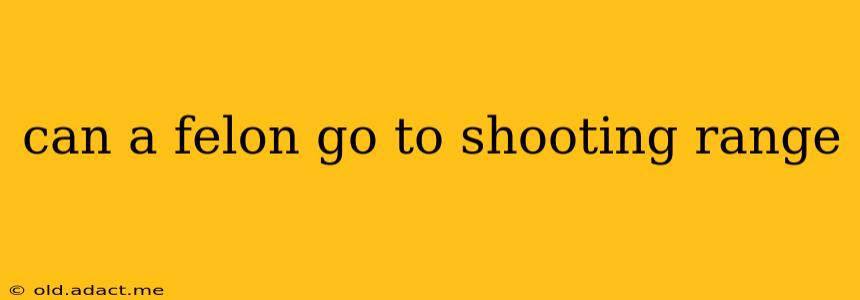The question of whether a felon can go to a shooting range is complex and depends heavily on several factors, including state and local laws, the specific nature of the felony conviction, and the policies of the shooting range itself. There's no single, straightforward answer. This guide will delve into the intricacies of this issue, providing clarity and guidance.
What are the Federal Laws Regarding Felons and Firearms?
Federally, 18 U.S. Code § 922(g) prohibits convicted felons from possessing firearms. This is a broad prohibition that encompasses a wide range of firearms, including handguns, rifles, and shotguns. The definition of "possession" can be quite expansive and includes not only direct ownership but also constructive possession (meaning the ability to exercise control over a firearm even if it's not in one's immediate possession).
This federal law forms the bedrock of restrictions surrounding firearms and felons. However, state laws can vary significantly, adding layers of complexity to the issue.
Can State Laws Allow Felons to Possess Firearms?
Some states have provisions that allow certain felons to regain their right to own firearms after a period of time, completion of probation or parole, or through a process of petitioning the court. Other states may have more restrictive laws or may not offer any exceptions to the prohibition against felon firearm ownership. It's crucial to understand the specific laws of the state in question. There is no blanket answer; each state's legal landscape differs dramatically.
What About Visiting a Shooting Range? The Legal Grey Area
Even in states where felon firearm ownership is prohibited, visiting a shooting range might not be explicitly illegal in all circumstances. However, it presents a significant legal gray area. Here's why:
- Access to Firearms: The primary issue is access to firearms. If a felon is allowed to handle or even touch a firearm at a shooting range, it could potentially constitute a violation of federal or state laws regarding possession, depending on the specifics of the interaction.
- Range Policies: Shooting ranges themselves frequently have their own policies concerning individuals with criminal records. Many ranges explicitly prohibit entry to anyone with a felony conviction related to firearms or violence.
- Liability: The range owners may face potential legal liability if they allow a felon to handle firearms and a violation occurs.
Therefore, even if state laws don't directly prohibit a felon from being at a shooting range, many ranges will prohibit them from participating in activities involving firearms due to their own liability concerns.
Can a felon own a firearm after completing their sentence?
The answer to this question depends entirely on state and federal law, as well as the specifics of the felony conviction. Some states may restore firearm rights after a certain period, while others may not. This is a crucial matter that requires consulting a legal professional familiar with state and federal gun laws.
Are there any exceptions to the law prohibiting felons from possessing firearms?
Some states might have exceptions for certain types of felonies, allowing individuals with non-violent or minor offenses to regain their firearm rights after completing their sentence and potentially meeting other conditions. This is highly variable by state and the specifics of the crime and should be confirmed by legal counsel.
What happens if a felon is caught at a shooting range?
The consequences of a felon being caught at a shooting range handling a firearm can vary significantly depending on the state and the specific circumstances. It could range from a misdemeanor charge to a felony charge, potentially leading to imprisonment or other penalties.
How can a felon learn more about their rights concerning firearms?
It is highly recommended that felons seeking clarification on their rights regarding firearms contact a lawyer specializing in gun laws in their state. They can provide accurate and tailored advice based on individual circumstances and the specifics of the felon's case.
Disclaimer: This information is for educational purposes only and should not be considered legal advice. Consult with a legal professional for guidance regarding your specific situation. Laws concerning firearms and felons are intricate and subject to change, so staying informed is vital.
